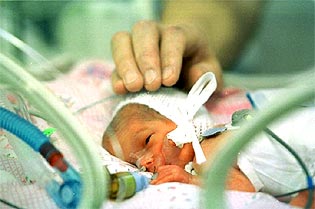Should babies like this be allowed to die?
PREMATURE babies born at or before 22 weeks should not be routinely resuscitated or given intensive care, according to a report on sick and disabled newborns.
The controversial report from the Nuffield Council on Bioethics (NCB), an independent body which debates ethical questions raised by medical advances, sets out guidelines on medical care for premature babies.
Last night, the British Medical Association and ethics experts in Scotland said they did not support the imposition of time limits and that each case should be assessed on an individual basis.
Although medical advances can sustain the lives of very premature babies, many do not live very long, or have a high rate of disability. The problem is compounded by the fact that it is not always apparent to doctors which babies will survive.
The NCB's Critical Care Decisions in Foetal and Neonatal Medicine report also sets out guidelines on resolving arguments between parents and doctors over the fate of babies.
The report found it is "extremely rare" for babies born before 22 weeks to survive and only about 1 per cent of babies born between 22 and 23 weeks survive to leave hospital.
The guidelines recommend that intensive care should not be given before 22 weeks and babies born between 22 and 23 weeks should not, in normal practice, be given intensive care unless parents request it and doctors agree.
Professor Margaret Brazier, who chaired the committee that produced the guidelines, said: "We don't think it is always right to put a baby through the stress and pain of invasive treatment if the baby is unlikely to get any better and death is inevitable."
The report recommends that parents of babies born between 23 and 24 weeks should have the final say on whether intensive care is given. For babies born between 24 and 25 weeks, normal practice should be to give intensive care, unless the parents and doctors agree that there is no hope of survival, or if the level of suffering outweighs the baby's interests in continuing to live, the council said.
Over 25 weeks, babies have a sufficiently high chance of surviving and low risk of developing severe disability, and intensive care should normally be given.
Research has shown the percentage of babies born alive in 1995 between 22 to 23 weeks who survived to leave hospital was 1 per cent; at 23 to 24 weeks it was 11 per cent; at 24 to 25 weeks, 26 per cent; and 25 to 26 weeks, 44 per cent. Survival before 22 weeks is very rare.
But Dr Tony Calland, BMA chairman of the Medical Ethics Committee, said: "We believe blanket rules do not help individual parents or their very premature babies. Each case should be considered on its merits and its own context."
Dr Calum MacKellar, of the Scottish Council on Human Bioethics, said parents and clinicians should be free to make "decisions without feeling strait-jacketed by broad-brush guidelines".
Adam Gaines, director of Disability Rights Campaign Scotland, said: "We must always guard against stereotypical assumptions about disabled people's quality of life."
Preparing for the worst
WHEN Pamela Tosh gave birth to her baby at 25 weeks, doctors told her there might be problems ahead. Eva spent four months in Edinburgh Royal Infirmary after her birth in March 2005, weighing just 1lb 6oz.
But now, at 20 months, she appears to be doing well with no serious health problems.
Ms Tosh, right with Eva, recalls: "The consultant told us that they were looking after the baby and that she was doing fine, but that we had to be prepared for all sorts of things. This might be cerebral palsy, blindness, deafness and learning difficulties. They wanted to be positive, but they had to tell us about what could happen."
Ms Tosh, 38, had to give birth early because she had dangerously high blood pressure. While in hospital, Eva had to have an operation on a twist in her bowel and Ms Tosh said there were times when she and her husband, Neil Willett, did not know whether their baby would survive.
"She is doing fine now, but we can't be 100 per cent she is going to be perfect in the future," she said.
She has concerns about the Nuffield recommendations. She said some women may not be certain of their due date and may be further on than they have been told.
Source: The Scotman


No comments:
Post a Comment